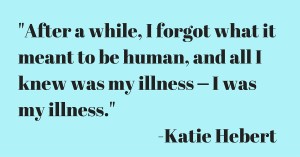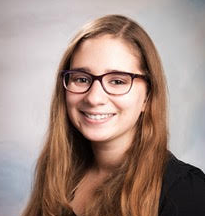
When I was twelve years old, I became sick with the H1N1 flu virus, walking pneumonia, and mononucleosis all within three weeks of each other. Because of this, my body stopped being able to regulate my autonomic nervous system and I was diagnosed with Postural Orthostatic Tachycardia Syndrome (POTS). Subsequently, doctors found that I also had Ehlers-Danlos Syndrome (EDS) and mitochondrial disease, which I had from birth, but had gone undiagnosed. I was told these illnesses are chronic, and I will have them for the rest of my life. Coping with this was very difficult, especially because I was too sick to go back to school. If I never had these experiences, I would have never become the strong person I am today, and this is why I want to share my story.
I was bedridden for three years, and during this time, I was barely able to do any schoolwork, let alone go out and be with my friends. This was the most difficult time of my life, not just physically, but emotionally. When I first got sick, I received get-well-soon notes from my entire grade, and people would visit on the weekly basis. But as time went on, people moved on, which now looking back on it, makes sense. But at the time, it was utterly heart-breaking. I still am so grateful for those that were thoughtful enough to stay in contact with me, and I no longer hold any ill-will towards those that I considered my best friends, who seemed to just stop caring one day.
Back then, I thought it was all their fault, and if my friends really cared about me, they would stop by, or at least text. Now, I realize I wasn’t helping the situation either. I was so depressed that I would never initiate the conversation. I would never send a message on Facebook to my best friend of six years and say, “Hey! How are you doing?” Or call them up just to see what the latest gossip was in middle school. I was so paranoid (because of so many doctors telling me that I was “faking it” and that “I wasn’t really sick”) that I had it stuck in my mind that the reason my best friend “abandoned me” was because her parents were doctors and they told her that I wasn’t really sick.
Needless to say, that friendship faded, along with many others. And because of this, most of my interactions with other people were all medically based, whether that be with doctors, therapists, or community groups. After a while, I forgot what it meant to be human, and all I knew was my illness ⎼⎼ I was my illness. I could name the latest and greatest of what was happening in the medical world, which doctors were becoming more or less popular, and which medications “were looking promising for individuals that experience certain POTS symptoms.” I don’t think I need to even say that after three years of this, if you put me in a room with healthy teens my age, I would be completely lost.
Finally, that day did come, and it was on my first day of high school. I went into my first day freshman year thinking I was the coolest person ever, and that I would rule the place. I thought I would have an advantage over the rest of my class because I had already done 9th grade once, and I would be older and much wiser than everyone else. This was not the case, in either aspect.
My family and I wanted to find a high school that would be fit to all of my needs ⎼⎼ small class sizes, understanding teachers, and NO STAIRS ⎼⎼ and The Nora School fit perfectly. They were nice, accommodating, and I fell in love. I thought the transition would be a breeze. To a certain extent, I was right. I got along with all of my teachers splendidly, and the administration loved me. The students, well… that took some work. Now let me get this straight, The Nora School is a family, and I never got a sense of anything different, but making friends can be hard, especially when you have been out of practice for a while.
Like I said earlier, I had lost contact with most of my friends when I was 12, and at this point, I was 15, so not only did I not know how to talk to teenagers, but I was crippled by the fear of being abandoned by them when I eventually told them of my illness. So with this in mind, I did my best to “act normal” in my first few days of school. This did not work out well. Not only did I not know how to “act normal”, but I also was completely unsure of what “normal” was for a teenage girl.
I was annoying, bossy, and a kiss-up my first few weeks of school, according to my now friends. Yes! Did you hear that!? I made friends! It took a while, and the fact that I never saw anyone from school outside of school made it take longer, but I made friends! Honestly it took a few years to build up these friendships to the point where I can say that I will be close with these people far after we graduate high school.
After the first few days of freshman year, when I saw that my humor, and all around good charm of acting like a middle schooler wasn’t cutting it, I started to observe. I wanted to understand the beast that we call “a teenage girl” before I committed to spending time with it. The main thing I observed was that they always are complaining about things, that to me at the time, really seemed like luxuries. In my first week, I specifically remember a classmate talking about how she was “soooo bummed” because she broke her nail and she was having guy troubles. In my mind, I was furious. How could someone like that think that they are having the worst day ever when I was in about ten minutes going to have to go into the bathroom stall and change the padding around my G/J tube because it constantly leaked this smelly, gross, liquid. I couldn’t find myself able to relate at all to what they were saying.
What I did was I find something that we could have in common. Many of you may have heard of the show, Supernatural. It’s great, if you haven’t watched it, like me at the time. The majority of the girls in my class loved the show, so over the course of about three weekends, I binge watched the entire show on Netflix and when I went to school the next day, I had something to talk about with my classmates. This gave me an immediate connection with them that I couldn’t find before. Now, I would take this with a grain of salt, and I am not asking you to go out and do what everyone else at your school does because that could take you into dangerous territory. But, instead of looking at the big picture of a person, and the things you don’t have in common, focus on what you do, and expand upon that. I used Supernatural as my way in, and once I was able to establish a rapore with my fellow classmates, it then became easy to see who I would be able to have that natural friendship with.
It is sometimes difficult to decide when or who to disclose your medical problems to, if at all. Personally, I live by the philosophy of not talking about it unless someone asks. If they do ask, I will be completely honest with them about my experiences. For example, in my first week of high school, I didn’t tell any of my classmates about my condition until one day when we were all supposed to go on a hike as a bonding experience and I had to sit out for medical reasons. My future best friend asked why I wasn’t going on the hike, and I first said, “Well, I have some medical problems that make it hard for me to do physical activity.” Of course, she asked (in a very nice way) what I had, and I told her, and the rest is history.
I found that it is important to always give people a way out of that conversation. You never know what that person may be going though and they might not want to hear your story at that time, and that is totally okay! They may ask if they could talk to you about it later, or maybe they won’t say anything because your brief description is all they needed/wanted to know at that time. Don’t take it personally if they don’t seem interested.
Also, if you don’t feel comfortable talking to someone about your personal medical issues, remember that they are called personal for a reason. We all get so used to going to the doctors and telling them everything. If someone (that is not your doctor) starts to poke around in your business, maybe you should remind them that it is your business. Plus it has always been fun for me to be able to walk down my hallway at school and think, “No one knows. They are the only people in my life that don’t know about my medical conditions and they treat me like a normal person.” It can give you a great confidence boost to be able to get to know people and have people get to know you, not the POTS. All of this being said, if you are going to be in a situation where you might pass out or something, a little heads up to the person you are with is always a nice thing to do.
Going back to school can be very difficult, and the anxiety can be completely crippling. But if you go everyday that you can, you will find that it gets easier and easier, until that fear finally all together goes away without you even noticing it; and in its place friends, learning and fun can become your normal.
 Katie Herbert is an 18-year-old POTS/EDS/Mitochondrial Disease patient who was diagnosed at age 12. After being home-bound for three years, she returned to classes full-time for high school and will graduate in June. Katie volunteers for Dysautonomia International and will begin her freshman year at Grinnell College in the fall.
Katie Herbert is an 18-year-old POTS/EDS/Mitochondrial Disease patient who was diagnosed at age 12. After being home-bound for three years, she returned to classes full-time for high school and will graduate in June. Katie volunteers for Dysautonomia International and will begin her freshman year at Grinnell College in the fall.